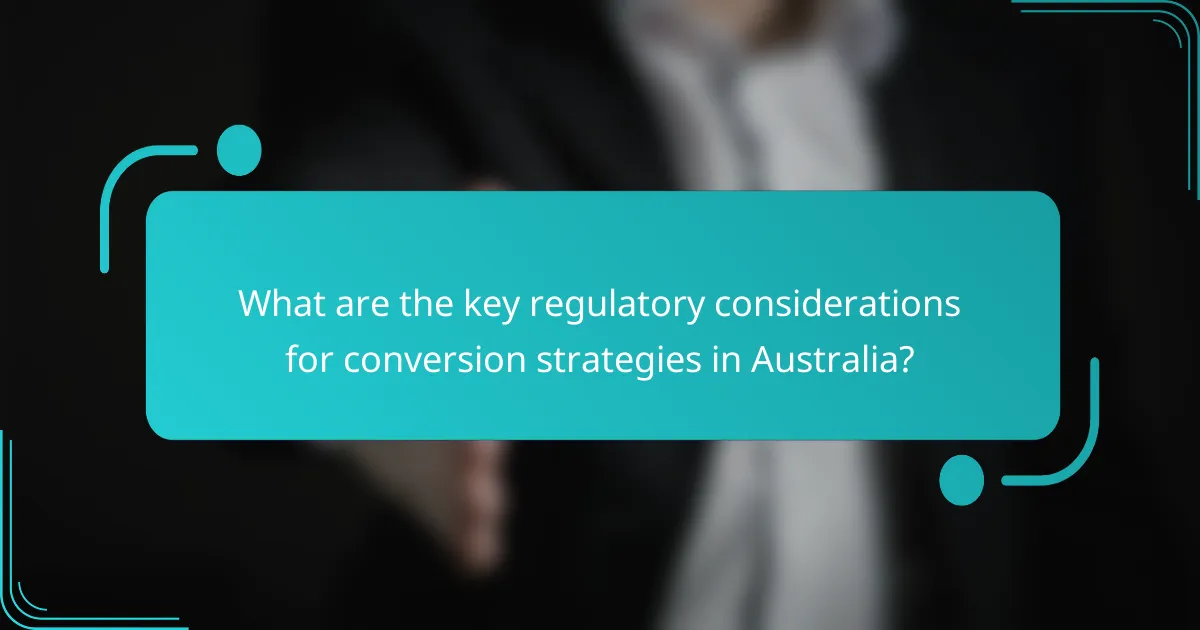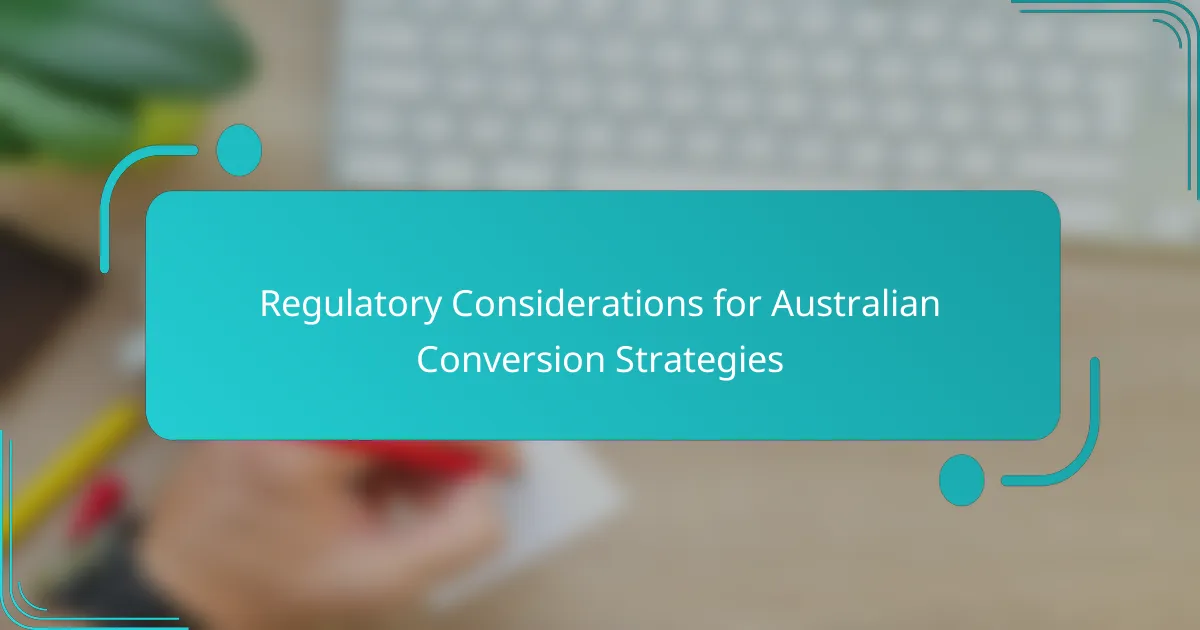In Australia, businesses must carefully consider key regulatory frameworks when developing conversion strategies, including consumer protection laws, privacy regulations, and advertising standards. Compliance with the Australian Consumer Law (ACL) is essential, requiring transparency and fairness in all consumer interactions. Additionally, prioritizing data protection practices is crucial for maintaining user trust and adhering to legal requirements.

What are the key regulatory considerations for conversion strategies in Australia?
Key regulatory considerations for conversion strategies in Australia include compliance with consumer protection laws, privacy regulations, and advertising standards. Businesses must navigate these frameworks to ensure their strategies are lawful and effective.
Australian Consumer Law compliance
Australian Consumer Law (ACL) mandates that businesses must not engage in misleading or deceptive conduct when implementing conversion strategies. This includes providing clear and accurate information about products and services to avoid potential penalties.
To comply, businesses should ensure that all marketing materials, including online content, are truthful and not misleading. Regular audits of promotional strategies can help identify and rectify any compliance issues.
Privacy Act requirements
The Privacy Act governs how businesses collect, use, and disclose personal information. Conversion strategies must align with these requirements, ensuring that customer data is handled responsibly and transparently.
Businesses should implement clear privacy policies and obtain consent from users before collecting their data. Regular training for staff on privacy obligations can help mitigate risks associated with data breaches.
Advertising Standards Code adherence
The Advertising Standards Code outlines principles for responsible advertising in Australia. Conversion strategies must adhere to these guidelines to avoid complaints and potential sanctions.
Marketers should ensure that their advertisements are not offensive, misleading, or exploitative. Reviewing campaigns against the Code before launch can help ensure compliance and protect brand reputation.
Financial Services Reform Act implications
The Financial Services Reform Act (FSRA) regulates financial services and products, requiring businesses to provide clear information to consumers. Conversion strategies involving financial products must comply with these regulations to avoid legal repercussions.
Businesses should ensure that any financial advice or promotions are backed by appropriate licenses and that all necessary disclosures are made to consumers. Consulting with legal experts can help navigate these complex requirements.
Data protection regulations
Data protection regulations in Australia require businesses to implement measures that safeguard personal information. Conversion strategies must consider these regulations to protect customer data and maintain trust.
Employing encryption, access controls, and regular security assessments can help mitigate risks associated with data handling. Businesses should also stay updated on changes in data protection laws to ensure ongoing compliance.

How to ensure compliance with Australian Consumer Law?
To ensure compliance with Australian Consumer Law (ACL), businesses must adhere to specific guidelines that protect consumer rights. This includes providing clear information, fair trading practices, and ensuring that all claims made about products or services are truthful and not misleading.
Clear terms and conditions
Clear terms and conditions are essential for compliance with the ACL. Businesses should present these terms in a straightforward manner, avoiding complex legal jargon that may confuse consumers. Ensure that all conditions related to purchases, returns, and warranties are easily accessible and clearly stated.
For example, if a product has a warranty, specify the duration and what it covers. This transparency helps consumers make informed decisions and reduces the risk of disputes.
Transparent pricing practices
Transparent pricing practices are crucial under the ACL. Businesses must display prices clearly, including any additional fees or charges that may apply. This means that the total cost should be evident before the purchase is completed.
For instance, if a service has a base fee plus a surcharge, both should be listed upfront. Avoid hidden costs, as they can lead to consumer dissatisfaction and potential legal issues.
Accurate advertising claims
Accurate advertising claims are vital for compliance with the ACL. All marketing materials must reflect the true nature of the product or service, avoiding exaggeration or misleading statements. This includes ensuring that any promotional offers are genuine and clearly defined.
For example, if advertising a discount, specify the original price and the percentage off. Misleading claims can result in penalties and damage to your business’s reputation, so it’s essential to verify all information before publication.

What are the best practices for data protection in conversion strategies?
Best practices for data protection in conversion strategies focus on safeguarding user information while ensuring compliance with relevant regulations. Implementing robust measures can help maintain user trust and avoid legal repercussions.
Implementing GDPR-like measures
Adopting measures similar to the General Data Protection Regulation (GDPR) is crucial for Australian businesses, especially those engaging with European customers. This includes ensuring transparency in data collection and processing, as well as providing users with clear information about their rights.
Key steps involve updating privacy policies, enabling data access requests, and allowing users to easily withdraw consent. Businesses should also consider appointing a Data Protection Officer (DPO) to oversee compliance efforts.
Regular data audits
Conducting regular data audits helps identify vulnerabilities and ensures compliance with data protection standards. These audits should assess how data is collected, stored, and processed, as well as evaluate the effectiveness of current security measures.
Establish a routine schedule for audits, such as quarterly or biannually, and document findings to track improvements over time. This proactive approach can help mitigate risks and enhance overall data security.
User consent management
Effective user consent management is vital for maintaining compliance and building trust. Businesses should implement clear mechanisms for obtaining, recording, and managing user consent for data processing activities.
Utilize consent management platforms that allow users to easily opt-in or opt-out of data collection. Regularly review consent practices to ensure they align with current regulations and user expectations, and provide users with straightforward options to modify their preferences.

How to navigate the Privacy Act in Australia?
Navigating the Privacy Act in Australia involves understanding how personal information is defined, the obligations for data breach notifications, and the rights individuals have under the Act. Compliance is crucial for organizations to avoid penalties and maintain trust with their customers.
Understanding personal information definitions
The Privacy Act defines personal information as any data that can identify an individual, including names, addresses, and contact details. Organizations must ensure they understand what constitutes personal information to comply with the Act effectively.
Additionally, sensitive information, such as health records or financial details, is subject to stricter regulations. Organizations should categorize the types of personal information they handle to implement appropriate protections.
Data breach notification obligations
Under the Privacy Act, organizations must notify affected individuals and the Office of the Australian Information Commissioner (OAIC) if a data breach is likely to result in serious harm. This notification must occur as soon as practicable after becoming aware of the breach.
Organizations should have a clear data breach response plan in place, including procedures for assessing the breach, notifying affected parties, and mitigating harm. Regular training and updates to this plan can help ensure compliance and reduce risks.
Rights of individuals under the Privacy Act
Individuals have several rights under the Privacy Act, including the right to access their personal information and request corrections if it is inaccurate. Organizations must respond to these requests promptly and transparently.
Additionally, individuals can complain to the OAIC if they believe their privacy rights have been violated. Organizations should establish clear processes for handling such complaints to maintain compliance and improve customer relations.

What frameworks can guide conversion strategy development?
Effective conversion strategy development in Australia can be guided by various frameworks that emphasize risk management and compliance. Utilizing these frameworks helps ensure that strategies are not only effective but also adhere to relevant regulations and standards.
Risk assessment frameworks
Risk assessment frameworks provide a structured approach to identifying, analyzing, and mitigating potential risks associated with conversion strategies. In Australia, frameworks such as the AS/NZS ISO 31000:2018 offer guidelines for risk management processes, helping organizations to systematically evaluate risks.
When applying a risk assessment framework, consider key steps such as risk identification, risk analysis, and risk evaluation. For instance, organizations should assess risks related to financial implications, data security, and operational disruptions, prioritizing them based on their potential impact.
Compliance checklists
Compliance checklists serve as practical tools to ensure that conversion strategies meet legal and regulatory requirements in Australia. These checklists can include items related to consumer protection laws, privacy regulations, and industry-specific standards.
To create an effective compliance checklist, identify relevant regulations such as the Australian Consumer Law and the Privacy Act 1988. Include specific actions like verifying consent for data usage and ensuring transparent communication with customers. Regularly updating the checklist is essential to adapt to changing regulations and maintain compliance.

What emerging trends should marketers watch in Australian regulations?
Marketers in Australia should closely monitor the evolving landscape of regulations, particularly those related to digital privacy and consumer protection. These trends are shaping how businesses collect, store, and utilize consumer data, necessitating a proactive approach to compliance.
Increased focus on digital privacy
The Australian government is placing greater emphasis on digital privacy, driven by consumer demand for transparency and control over personal information. Marketers must navigate the complexities of the Privacy Act and the Australian Privacy Principles (APPs), which dictate how personal data should be handled.
To comply, businesses should implement clear data collection policies, ensuring consumers are informed about what data is collected and how it will be used. Regular audits of data practices can help identify areas for improvement and mitigate risks associated with non-compliance.
Marketers should also consider adopting privacy-by-design principles, integrating privacy measures into their marketing strategies from the outset. This proactive approach not only builds consumer trust but also positions brands favorably in a competitive market increasingly focused on ethical data practices.
